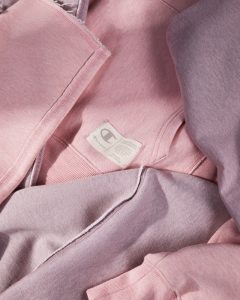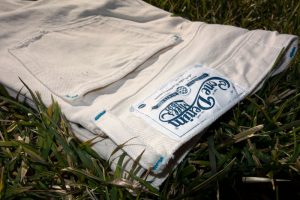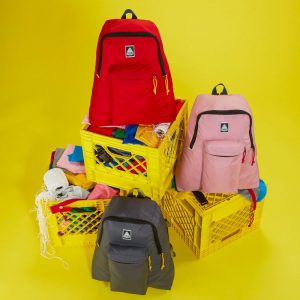
Textile manufacturers and brands are developing innovative strategies to make the textile and apparel industry more sustainable.
TW Special Report
Each year, Earth Day typically coincides with a steady flow of new stories pointing to sustainable actions textile and apparel companies have achieved or are in the process of implementing. Companies also issue their annual Corporate Sustainability Reports (CSRs), reporting accomplishments and targets for future years. Sustainability is not a new concept in the industry, but it is an issue that has great momentum at the moment. Companies from textile manufacturers to brands are reporting huge efforts to make the textile industry a more sustainable entity.
Sustainability Reports
Spartanburg-based Milliken & Company recently released its third annual CSR. The report titled “Together for Tomorrow,” highlights the company’s progress towards 2025 goals set back in 2018. According to the company, “this report creates increased accountability while inviting new conversations and collaborations as the company works to create a positive impact on the world that will last generations.”
“Together, we met the critical moments from 2020,” said Milliken’s President and CEO Halsey Cook. “We pivoted production lines, launched new innovations, and rallied our team to improve our sustainability metrics in 10 of 12 strategic categories. Our sustainability initiatives have momentum and are fundamentally changing our business.”
Milliken reported progress in 2020 in a number of its planet and product goals including: capital investments to eliminate coal as a primary fuel source; the Borchers acquisition to help the company scale its coating additives platform while reducing solvent use; and convening thought leaders at an event hosted by National Geographic Creative Works to support the plastics circularity conversation.
With regards to the company’s people goals, Milliken reported an ongoing commitment to advancing diversity, equality and inclusion; prioritizing associate safety; and launching the Milliken Leadership Model, aimed at training associates on growth leadership with purpose.
Glen Raven Inc. also just released its first CSR (“See “Corporate Responsibility In Flight,” TW, this issue). The report aims to strengthen Glen Raven’s history as a good corporate citizen.
Charlotte-based Elevate Textiles — the parent company of American & Efird (A&E), Burlington, Cone Denim, Gütermann and Safety Components — recently issued its 2021 Sustainability Report. According to the company, it made significant progress towards its 2025 sustainability goals, which include a focus on sustainably-sourced fibers, reduced water consumption and a reduction in greenhouse gas emissions. The company has aligned its goals with the United Nations’ (UN) Global Compact’s Ten Principles — which lays out fundamental corporate responsibilities for sustainability in the areas of human rights, labor, environment and anti-corruption. This follows Elevate’s own “Ten Threads of Sustainability” environmental program (See “U.S. Textiles: Pacesetters In Sustainability,” TW, July/August 2018).
Areas of progress highlighted in Elevate’s 2021 Sustainability Report include: a water recycling increase of 65 percent and a 7.5-percent reduction in absolute global water consumption since 2016; and measurement of Scope 3 greenhouse gas emissions and a reduction in Scope 1 and 2 greenhouse gases in line with a corporate goal of 2.5 percent per year.
“We are focused on providing ethically and sustainably sourced products that offer innovative solutions needed to be successful, and we view our teams and global resources as a collaborative extension and partner to our customers, suppliers, employees, communities and other stakeholders,” said Sim Skinner, president and CEO of Elevate Textiles.
In addition, Elevate announced that it has joined the Sustainable Apparel Coalition (SAC), joining more than 250 global brands, retailers, manufacturers, government entities, non-profit organizations and academic institutions that are committed to improving sustainability in the apparel, footwear and textile industry supply chains. As part of its participation, Elevate has committed to contribute data and resources to support the Higg Index, a suite of tools that measures sustainability performance that Elevate brands have been using since 2014.
“We welcome the addition of Elevate Textiles to the Sustainable Apparel Coalition and look forward to its participation in this industry-wide effort in sustainability,” said SAC Executive Director Amina Razvi. “Having Elevate and each of its top textile brands as part of the coalition widens the scope of our impact within the industry and accelerates the change we’re making towards responsible industry actions.”
High Point, N.C.-based Culp Inc. recently joined the Sustainable Furnishings Council (SFC) — “an independent, non-profit coalition of furniture industry manufacturers, retailers, and designers dedicated to raising awareness and promoting the adoption of environmentally sustainable practices in the home furnishings industry.” SFC core beliefs focus on carbon reduction, water management, product circularity, and waste reduction, among other sustainable strategies.
According to Culp, as the only publicly-traded SFC company, it plans to use its membership to increase best practices and be a leader in the home furnishings industry with regards to environmental and social change.
Recent accomplishments by Culp include the use of solar panels at a Knoxville, Tenn., facility; using hydro- and wind power at a manufacturing facility in Quebec; reusing water at a plant in Stokesdale, N.C.; and achieving Zero to Landfill certification at all of its U.S. mattress fabric and sewn cover production facilities. Culp also has seen success with its LiveSmart Evolve® upholstery fabric line, which has to date, has diverted more than 1.6 million plastics bottles from landfills, according to the company. (See “Quality Fabric Of The Month: Culp’s LiveSmart® Gets Smarter,” TW, January/February 2021).
“By joining this council, we are hoping to further our efforts of incorporating sustainable practices into our operations and have a greater positive influence in our industry,” said Iv Culp, president and CEO. “We are known as an innovative and creative company committed to managing our business in a responsible manner. This not only applies to our fabric designs and material sourcing, but to our entire company culture. We are striving to find ways of operating that are better for the environment, for our customers, for our employees, and for our communities.”
HanesBrands, Winston-Salem, N.C., recently was awarded its 12th consecutive U.S. Environmental Protection Agency (EPA) Energy Star Sustained Excellence/Partner of the Year award. The EPA launched the Energy Star voluntary, market-based partnership program in 1992 to reduce greenhouse gas emissions via increased efficiency. The Partner of the Year honor recognizes organizations that have made outstanding contributions to environmental protection through company-wide energy savings and best practices. The EPA recognized HanesBrands for lowering overall energy use as well as increasing its use of renewable energy and electricity during 2020.
In 2020, the company named its first chief sustainability officer. HanesBrands reports it also implemented 2030 sustainability goals including further reducing energy use by 25 percent, moving to 100-percent renewable electricity and launching science-based emission reduction targets.
“We’re incredibly proud to remain the only apparel company to earn sustained excellence honors in the U.S. EPA Energy Star program’s 29-year history,” said Chris Fox, HanesBrands chief sustainability officer. “HanesBrands and its 61,000 worldwide associates are deeply committed to sustainability and operating our company as if every day is Earth Day. But there is much more work yet to do. We are intensely focused on pursuing ambitious 2030 goals that will improve the lives of people, protect the planet and produce sustainable products.”
Water-Saving Strategies
Greensboro, N.C.-based Kontoor Brands — parent company of the Wrangler® and Lee® denim brands — has expanded its water-saving Indigood™ program beyond foam-dyed denim to include any technology used in apparel fabric production that utilizes at least 90-percent less water than conventional processes.
“Water is one of our most vital and precious natural resources, and as such, we are focused on advancing the sustainable and equitable management of water resources,” said Jeff Frye, vice president of product development and direct procurement, Kontoor Brands. “By expanding the Indigood program to include additional water saving technologies, we’re giving our suppliers the opportunity to select the water savings technologies that work best for their production, while also meeting the growing consumer demand for products that not only look good, but also minimize the impact on the planet.”
In other sustainability news, Wrangler recently launched the WeCare Wrangler™ sustainability platform aimed to guide sustainable innovation in three key areas — planet, product and people. The platform includes goals such as using preferred chemistry, renewable energy and sustainable cotton, as well as reducing water use.
“It matters to Wrangler what’s in our clothing,” said Tom Waldron, executive vice president, global brand president, Wrangler. “The WeCare Wrangler sustainability platform will act as our roadmap as we help lead the industry toward meaningful change that creates more positive environmental and social impacts.”

Elevate company Cone Denim has long been committed to responsible water use and global water conservation efforts in denim manufacturing. Recently, the company released details on the next phase of its water reduction initiatives, which includes a Zero Liquid Discharge wastewater treatment facility at Mexico-based Cone Denim Parras.
“We are focused on a sustainable future and minimizing our impact on natural resources,” said Cone Denim President Steve Maggard. “To support these efforts, we’ve affirmed our commitment to the UN Sustainable Development Goals with our water conservation initiatives focused on Goal number 6: Clean Water and Sanitation. We are driving conservation efforts throughout our manufacturing processes and establishing greater transparency and improved ways to monitor, track and report our progress.”
Cone Denim also partnered with Spain-based Jeanologia S.L. on a new denim collection that is the first step in Jeanologia’s “Road to Mission Zero.” Mission Zero is the commitment to eliminating 100-percent of the waste generated during denim production. The collection features sustainable options from fabric to finish including Cone Denim Flash Finish fabric manufactured using Jeanologia’s G2 Dynamic ozone finishing ranges.
In other company sustainability news, Cone reports it is on track to use almost 3 million pounds of certified Organic Content Standard (OCS) cotton by the end of 2021 in the production of its organic denim cotton collection. The company has worked with suppliers to secure inventory of this limited cotton product. All Cone Denim mills are OCS certified to make organic yarns and denim fabrics, and the company was the first denim manufacturer to offer Oritain technology for scientific cotton origin certification.
Unifi Recognizes Brand, Textile And Retailer Partners
Unifi Inc., Greensboro, N.C., recently announced the recipients of its fourth annual REPREVE® Champions Of Sustainability Awards. As a fiber producer, Unifi has long been a champion of sustainability in its own right and certainly leads by example. The company has recycled more than 25 billion plastics bottles in its REPREVE fiber manufacturing process, which uses less energy and water compared to virgin fiber production. Unifi reports it is on track to reach its goal of recycling 30 billion bottles by 2022. (See “Sustainability In Fiber Manufacturing,” TW, this issue, to learn more about sustainability efforts by other fiber companies).
Unifi’s REPREVE Champions of Sustainability awards “recognize brand, textile and retail partners that have demonstrated a true commitment to supporting a sustainable world.” In 2021, 93 companies were honored — the largest number of recipients since the awards’ inception.
In 2021, 38 brand and retail partners that transformed 10 million or more recycled plastic bottles and 55 textile partners that transformed 50 million or more recycled bottles were recognized by Unifi. The list of winners is available on TW’s website.
Unifi also conferred two special category awards: REPREVE Newcomer to Switzerland-based Odlo; and the REPREVE Leading the Change award to Turkey-based Penti.
“Despite the COVID-19 pandemic, Unifi remains successful because of its customers,” said Unifi CEO Eddie Ingle. “With a nearly 20-percent increase in the number of winners from the previous year, our brand partners are demonstrating a steadfast commitment to sustainability. We want to thank them for their support for a more sustainable world during these unparalleled times.”
Brand-Led Sustainability Efforts
On a mission to make clothes that feel good and do good as part of its Champion MADE promise, Winston Salem, N.C.-based Champion Athleticwear has introduced two new lines — the Natural State Reverse Weave and Rally Pro Earth footwear.
The Natural State collection features recycled polyester fibers; minimally processed and unbleached fabrics; and uses only all-natural dyes derived from flowers, plants and roots for muted, natural colors. The Rally Pro Earth sneaker collection comprises Rally Pro sneakers made using more earth-friendly materials including upcycled and recycled products.
“We are dedicated to helping protect the planet by creating best-in-class sustainable products,” said David Robertson, director, Champion Global Brand Marketing. “The launch of Natural State and Rally Pro Earth are only the beginning of what we have in-the-works to protect the place we all call home.”
Lululemon athletica inc., Vancouver, recently announced two new initiatives — lululemon Like New and Earth Dye — as part of the Be Planet pillar of its Impact Agenda released in the fall of 2020.
Like New is lululemon’s first recommerce program that will allow customers to trade in or resell the brand’s clothing. Pilot programs will first launch in California and Texas, and profits from the program will be directly reinvested in additional sustainability programs.
The Earth Dye initiative focuses on a limited-edition collection of clothing dyed using upcycled orange, beet and saw palmetto tree waste from the agricultural and herbal industries. According to the company, these lower-impact dyes use less water, carbon and man-made chemicals.
“lululemon is actively working to help create a healthier future, and we are focused on meeting the goals detailed in our Impact Agenda, including making 100 percent of our products with sustainable materials and end-of-use solutions by 2030,” said lululemon CEO Calvin McDonald. “Our lululemon Like New and Earth Dye initiatives are both meaningful steps towards a circular ecosystem and demonstrate the sustainable innovation underway in product development and retail.”
 Denver-based JanSport introduced its first backpack collection made using excess factory materials that otherwise may end up in a landfill. Every component of the limited-edition Surplus Ski n’ Hike backpacks — fabric, ladder lock lining and zipper pulls — come from pre-existing factory materials. Other key sustainability-related milestone also were reported by JanSport including: switching certain products to recycled fabrics and linings, which saved the equivalent of 13 million 16-ounce plastic water bottles; implementing renewable energy sources and energy efficient processes to reduce the company’s carbon footprint; using 100-percent recycled paper for hangtags; and designing all products to be polyvinyl chloride-free.
Denver-based JanSport introduced its first backpack collection made using excess factory materials that otherwise may end up in a landfill. Every component of the limited-edition Surplus Ski n’ Hike backpacks — fabric, ladder lock lining and zipper pulls — come from pre-existing factory materials. Other key sustainability-related milestone also were reported by JanSport including: switching certain products to recycled fabrics and linings, which saved the equivalent of 13 million 16-ounce plastic water bottles; implementing renewable energy sources and energy efficient processes to reduce the company’s carbon footprint; using 100-percent recycled paper for hangtags; and designing all products to be polyvinyl chloride-free.
“As part of our sustainability efforts, JanSport wants to keep fabric off the cutting room floor and ensure that our unused products do not go to waste,” said Roger Spatz, JanSport president. “We challenged our designers to construct a backpack collection entirely from surplus fabrics and components from our factory, and we could not be more impressed with the result. The Surplus Ski n’ Hike breathes new life into an archived silhouette and uses the textiles in a smarter, more sustainable way that prevents these elements from potentially going into landfill.”
In an effort to change how the apparel industry colors cotton by addressing water scarcity and pollution, New York City-based Ralph Lauren has launched the Color on Demand dyeing platform, which will be implemented in phases. Color on Demand comprises a new set of technologies that enables water reuse and recycling during the dyeing process for a scalable zero wastewater cotton dyeing system. Ralph Lauren reports the system also reduces the amount of dye, chemicals, time and energy used to color the cotton. The brand collaborated with Dow, Jeanologia, Huntsman Textile Effects and Corob to rethink the dyeing process and develop a more efficient system. The first phase of Color on Demand focuses on using ECOFAST™ Pure Sustainable Textile Treatment from Dow, which reduces water, chemicals and energy use for a 60-percent reduction in the carbon footprint when compared to traditional cotton dyeing processes. Ralph Lauren will launch products made using this treatment later this year.
“Water scarcity and pollution are important issues for the fashion industry and through our partnership with Ralph Lauren we are working towards addressing these challenges,” said Sheila Bonini, senior vice president, Private Sector Engagement at World Wildlife Fund. “Technology has the ability to accelerate change at a scale that matters, so it’s exciting to see Ralph Lauren establishing innovative new models that transform outdated practices and can deliver measurable outcomes for people and planet. This is exactly the kind of leadership we need to see from the fashion industry.”
Important issues indeed. But issues the manufacturers and brands seem to be tackling with innovative, forward-thinking solutions. The industry is full of leaders setting the bar and encouraging every company in the textile value chain to get involved and make a difference.
May/June 2021




